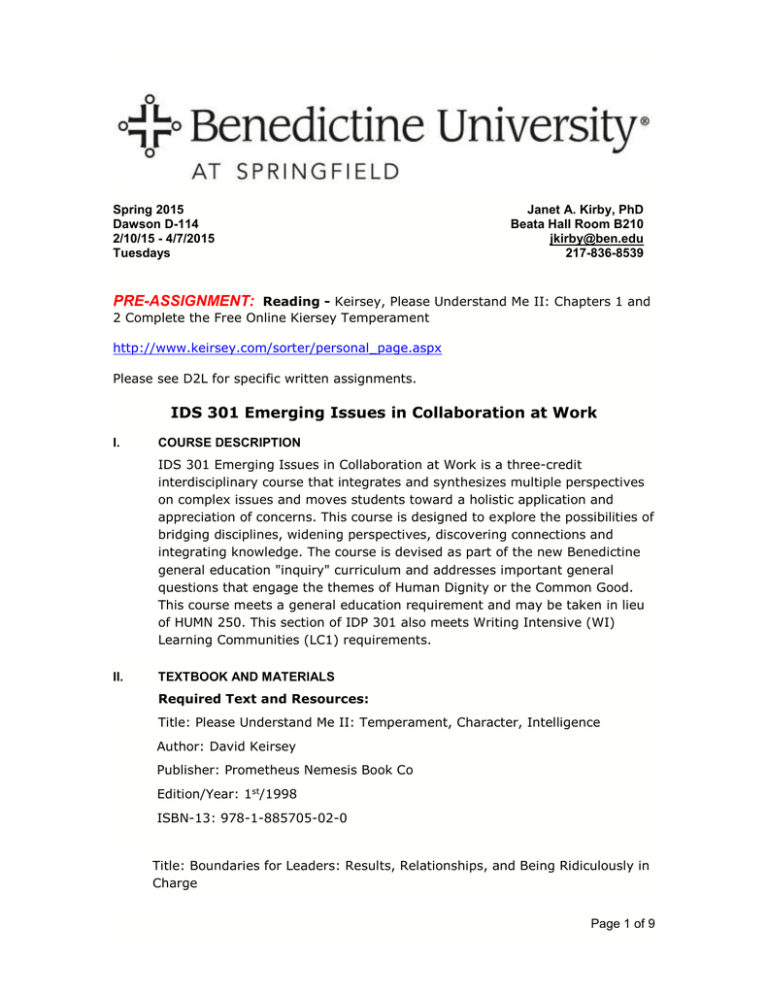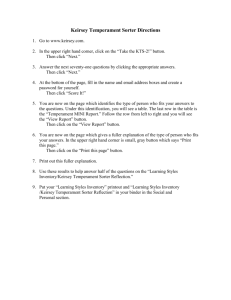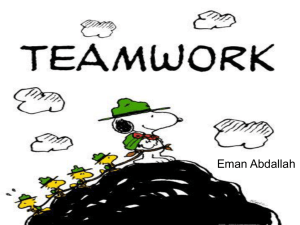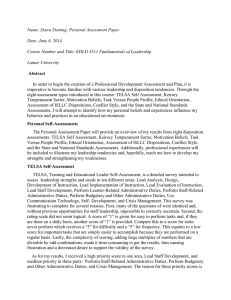Document 17998846
advertisement

Spring 2015 Dawson D-114 2/10/15 - 4/7/2015 Tuesdays Janet A. Kirby, PhD Beata Hall Room B210 jkirby@ben.edu 217-836-8539 PRE-ASSIGNMENT: Reading - Keirsey, Please Understand Me II: Chapters 1 and 2 Complete the Free Online Kiersey Temperament http://www.keirsey.com/sorter/personal_page.aspx Please see D2L for specific written assignments. IDS 301 Emerging Issues in Collaboration at Work I. COURSE DESCRIPTION IDS 301 Emerging Issues in Collaboration at Work is a three-credit interdisciplinary course that integrates and synthesizes multiple perspectives on complex issues and moves students toward a holistic application and appreciation of concerns. This course is designed to explore the possibilities of bridging disciplines, widening perspectives, discovering connections and integrating knowledge. The course is devised as part of the new Benedictine general education "inquiry" curriculum and addresses important general questions that engage the themes of Human Dignity or the Common Good. This course meets a general education requirement and may be taken in lieu of HUMN 250. This section of IDP 301 also meets Writing Intensive (WI) Learning Communities (LC1) requirements. II. TEXTBOOK AND MATERIALS Required Text and Resources: Title: Please Understand Me II: Temperament, Character, Intelligence Author: David Keirsey Publisher: Prometheus Nemesis Book Co Edition/Year: 1st/1998 ISBN-13: 978-1-885705-02-0 Title: Boundaries for Leaders: Results, Relationships, and Being Ridiculously in Charge Page 1 of 9 Author: Henry Cloud Publisher: HarperBusiness Edition/Year: 2013 ISBN-13: 978-0062206336 This course uses the online-Keirsey Temperament Sorter assessment tool. Each student must complete the Free Online Kiersey Assessment Tool http://www.keirsey.com/sorter/personal_page.aspx Only the Free report is required for the class. Feel free to purchase the more in depth reports. III. MISSION STATEMENT Benedictine University is dedicated to the education of undergraduate and graduate students from diverse ethnic, racial and religious backgrounds. As an academic community committed to liberal arts and professional education distinguished and guided by our Roman Catholic tradition and Benedictine heritage, we prepare our students for a lifetime as active, informed and responsible citizens and leaders in the world community. IV. GOALS, OBJECTIVES, AND STUDENT LEARNING OUTCOMES A. Goals and Objectives. Course Objectives Course Objective Describe the different personality temperaments and behaviors that typify personal preferences among others in communication and working. Distinguish and predict, through observation and personal analysis, the communication and work preferences of others. Survey and collect contemporary data on social issues and the impact of temperament preferences on the issues' thought leaders. Present thoughts and ideas in writing and speech with excellence. Incorporate theory, observations and work preferences into a personal strategy for collaboration with others, respectful of their uniqueness, value and their worth. Bloom Level 4. Analysis 5. Synthesis 6. Evaluation 2. Comprehension 6. Evaluation Interdisciplinary Competencies Interdisciplinary work integrates and synthesizes multiple perspectives on complex issues and moves students toward a holistic application and appreciation of concerns. As a result of successfully completing IDP 201 and IDP 301 students will practice the following interdisciplinary competencies: a. Recognize that assumptions, methods and inquiry distinguish disciplines; b. Gain strategies for distinguishing problems or issues that warrant an Page 2 of 9 interdisciplinary approach, c. Juxtapose synthesize and integrate disciplinary insights through the discovery of common ground, d. Begin to apply and appreciate holistic thinking B. Mode of Inquiry Goals IDP 301 As a result of successfully completing IDP 301 students will advance Essential Learning Goal 5 and 6 and practice at least one of the following competencies Advance at least one sub-goal under both Learning Goal 5 and 6 LG 5 Social Responsibility Maps to LG 5 Social Responsibility Engage ethical problems thoughtfully and actively, and contribute to the work of peace and social justice Week 1 Text Questions: Finding Keirsey LG 5 Social Responsibility Understand conflict resolution processes Week 1 Written Assignment - My Keirsey Type as a Strategy for Influence LG 5 Social Responsibility Practice stewardship of self and the environment, and understand the principles of wellness and sustainability Week 4 Discussion and Team Assignment - Whom Do YOU Trust? LG 5 Social Responsibility Develop the traits of good citizenship and gain knowledge and skills necessary for civic engagement Journal articles in Weeks 1-2 LG 6 Personal Growth Maps To LG 6 Personal Growth Develop intellectual curiosity and a desire for lifelong learning Journal articles in Weeks 3-5 F LG 6 Personal Growth Strive for a life Week 3 Written Assignment - Pay Page 3 of 9 lived in balance Attention! LG 6 Cultivate leadership skills Week 5 Written Assignment - Integrative Summary- Leading from Your Heart and Your Mind: A Pathway for Personal Influence with Others. LG 6 Personal Growth Nurture the capacity for creative and artistic expression Week 5 Written Assignment Integrative Summary- Leading from Your Heart and Your Mind: A Pathway for Personal Influence with Others. Advance Learning Goal 7C Integrate learning from different disciplines to illuminate intersecting topics of investigation Engage one of the following themes, (i.e. make it a central focus of the course-- one that is the subject of at least one writing assignment and at least one required text: Human Dignity or the Common Good Advance Learning Goal 7C Maps to Human Dignity Advance Learning Goal 7C This course trains you to be aware of your own style and temperament preferences in learning, working, socializing and communicating with others. It provides space for you to explore, identify and articulate a personal approach and strategy to leadership and working and the effect of these choices on others. Common Good Advance Learning Goal 7C V. TEACHING METHODS/DELIVERY SYSTEM The classroom is a writing and discourse community. This course is a combination of lecture, in-class discussion, online course management system discussions, in-class writing labs, online writing labs (using SMARTHINKING), revision workshop groups both in-class and online course management system, individual conferences, and formal evaluations. Regular, brief quizzes may be administered to ensure that readings have been completed; these quizzes may take place on paper or in discussion Q&A. This class is very interactive. In order to complete the course successfully, students must come to class and must be prepared to discuss the reading assignments and to do the in-class work. Page 4 of 9 VI. COURSE REQUIREMENTS Attendance Policy This course is highly accelerated, and students will need to take a great deal of responsibility for their own learning outcomes. Attendance is required in each class meeting for the full period of time. Any absence must be due to extraordinary circumstances and will require documentation for it to be considered excused. Documentation must be provided immediately in order to determine what, if any, accommodations are reasonable or possible. Class attendance will directly impact your final grade, and each undocumented absence will be considered unexcused and will result in a 20% reduction in the final grade for the course. Due to the accelerated nature of the course, should you experience a medical condition which prevents you from attending any class(es), appropriate medical documentation must be provided immediately so it may be determined what, if any, accommodations are reasonable or possible. Reading Assignments Please see Topical Course Outline (Section VIII). Written Assignments and Projects Week One: Two: Topics Keirsey, Chapters 1-2; Keirsey Temperament Indicator. Boundaries, Chapters 1-3 Hour one Hour Two Overview of Keirsey Hour Three Hour Four Types: Charting points of collaboration and conflict. Discussion of Types Weekly Journal Discussion Text Questions for Discussion Consulting Team Presentations Three: Boundaries, Chapters 4-7 Weekly Journal Discussion Text Questions for Discussion Consulting Team Presentations Four: Weekly Journal Discussion Text Questions for Discussion Consulting Team Presentations Five: Boundaries, Chapters 8-10 Weekly Journal Discussion Integrative Summary Presentations Benedictine University at Springfield Student Academic Honesty Policy The search for truth and the dissemination of knowledge are the central missions of a university. Benedictine University at Springfield pursues these missions in an environment guided by our Roman Catholic tradition and our Benedictine heritage. Integrity and honesty are therefore expected of all University students. Actions such as cheating, plagiarism, collusion, fabrication, forgery, falsification, destruction, multiple submission, solicitation, and misrepresentation are violations of these expectations and constitute unacceptable behavior in the University community. Page 5 of 9 Student’s Responsibility Though there is no formal honor code at Benedictine University at Springfield, students are expected to exhibit academic honesty at all times. Violations against academic honesty are always serious and may result in sanctions that could have profound long-term effects. The final responsibility for understanding the Academic Honesty Policy of the institution, as well as the specific policies for individual courses normally found in syllabi, rests with students. If any doubt exists about what constitutes academic dishonesty, students have the responsibility to talk to the faculty member. Students should expect the members of their class to be academically honest. If students believe one or more members of the class have been deceitful to gain academic advantage in the class, students should feel comfortable to approach the faculty member of the course without prejudice. Violations of the Academic Honesty Policy will be reported to the Office of the Dean of Academic Affairs. Along with a verbal warning, the following are consequences a student may face for academic dishonesty: a failing grade or “zero” for the assignment; dismissal from and a failing grade for the course; or dismissal from the Institution. VII. MEANS OF EVALUATION Grading Criteria Grades will be based on a total of 930 points. ● Discussion and (200 points) ● Written Assignments (420 points) ● Team Assignments (230 Points) ● Journal (80 Points) A = 90% - 100% 837 - 930 Points B = 80% - 89% 744 - 837 C = 70% - 79% 651 - 743 D = 60% - 69% 558 - 650 F = < 60% < 558 If a student believes that an error has been made in reporting a grade, an appeal must be made in writing to the instructor and must be initiated within 60 calendar days after the end of the term for which the grade in question was reported. The appeal should contain specific information about why it is believed the grade reported is inaccurate. See the Student Handbook for additional details. Add/Drop Dates Please refer to the current Academic Calendar for add/drop dates. Incomplete Request To qualify for an “I” grade, a minimum of 75% of the course work must be completed with a “C” or better, and a student must submit a completed “Request for an Incomplete” form to the Registrar’s Office. The form must be completed by both student and instructor, but it is the student’s responsibility (not the instructor’s) to initiate this process and obtain the necessary signatures. Page 6 of 9 Student Withdrawal Procedure It is the student’s responsibility to officially withdraw from a course by completing the appropriate form, with appropriate signatures, and returning the completed form to the Advising Office. Please refer to the Student Handbook for important financial information related to withdrawals. VIII. TOPICAL COURSE OUTLINE All Assignments are outlined in detail in D2L. Discussion and Team Assignments Points Week 1 Discussion - Born to Be Wild 50 Week 2 Discussion - Who Am I? 50 Week 3 Discussion - Feelings. Nothing More than Feelings. 50 Week 4 Discussion - Values Lead 50 Total Written Assignments 200 Points Week 1 Written Assignment - Finding Keirsey 30 Week 1 Keirsey Paper - My Keirsey Type as a Strategy for Influence. 100 Week 2 Written Assignment - The Buck Stops, Where? 30 Week 3 Written Assignment - Pay Attention! 30 Week 4 Written Assignment - Setting Your Own Boundaries 30 Week 5 Integrative Summary - Leading from Your 200 Page 7 of 9 Heart and Your Mind: A Pathway for Personal Influence with Others. Total Team Assignments Week 1 Team Assignment - Virtual Team Formation and Kiersey Temperment Types Discussion 420 Points 5 Week 2 Team Assignment - People: Can't work with 'em, Can't work without 'em (Part 2, Part 1 was done in the team discussion area) 75 Week 3 Team Assignment: What Are You Thinking! 75 Week 4 Team Assignment - Whom Do YOU Trust? 75 Total Written Assignment-Journal Articles 230 Points Week 2 Journal Article 20 Week 3 Journal Article 20 Week 4 Journal Article 20 Week 5 Journal Article 20 Total 80 Page 8 of 9 IX. AMERICANS WITH DISABILITIES ACT (ADA) Benedictine University at Springfield provides individuals with disabilities reasonable accommodations to participate in educational programs, activities, and services. Students with disabilities requiring accommodations to participate in campus-sponsored programs, activities, and services, or to meet course requirements, should contact the Resource Center as early as possible: springaccess@ben.edu or (217) 717-9253 X. ASSESSMENT Goals, objectives, and learning outcomes that will be assessed in the class are stated in this syllabus. Instructor will use background knowledge probes, one-minute papers, reflective essays and/or other Classroom Assessment Techniques as deemed necessary in order to provide continuous improvement of instruction. Page 9 of 9


